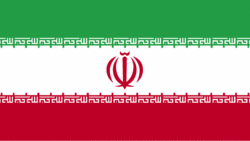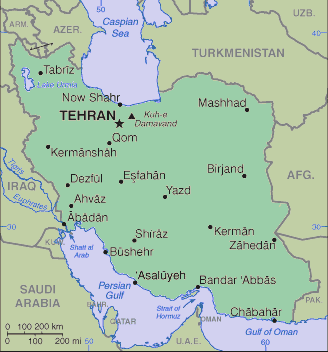Traveling Luck for Iran. Iran, Asia
Iran is located in Middle East, bordering the Gulf of Oman, the Persian Gulf, and the Caspian Sea, between Iraq and Pakistan.
Land in Iran is rugged, mountainous rim; high, central basin with deserts, mountains; small, discontinuous plains along both coasts.
Iranian land covers an area of 1648000 square kilometers which is slightly larger than Alaska
Iran has borders with Afghanistan for 936km, Armenia for 35km, Azerbaijan for 611km, Iraq for 1458km, Pakistan for 909km, Turkmenistan for 992km and Turkey for 499km.
 Iranian national flag (Flag of Iran)
Iranian national flag (Flag of Iran)
As for the Iranian climate; mostly arid or semiarid, subtropical along Caspian coast.
Iranian(s) speak Persian and Persian dialects 58%, Turkic and Turkic dialects 26%, Kurdish 9%, Luri 2%, Balochi 1%, Arabic 1%, Turkish 1%, other 2%.
Places of note in Iran
 Iranian map
Iranian map
Regions of Iran
- Ardabīl
- Āz̄ārbāyjān-e Gharbī
- Āz̄ārbāyjān-e Sharqī
- Būshehr
- Chahār Maḩāll va Bakhtīārī
- Eşfahān
- Fārs
- Gīlān
- Golestān
- Hamadān
- Hormozgān
- Īlām
- (IR02)
- (IR12)
- (IR17)
- (IR18)
- (IR19)
- (IR21)
- (IR24)
- (IR27)
- (IR30)
- (IR31)
- Iran (general)
- Kermān
- Kermānshāh
- Khorāsān-e Jonūbī
- Khorāsān-e Raẕāvī
- Khorāsān-e Shomālī
- Khūzestān
- Kohgīlūyeh va Būyer Aḩmad
- Kordestān
- Lorestān
- Markazī
- Māzandarān
- Qazvīn
- Qom
- Semnān
- Sīstān va Balūchestān
- Tehrān
- Yazd
- Zanjān
Known as Persia until 1935, Iran became an Islamic republic in 1979 after the ruling monarchy was overthrown and the shah was forced into exile. Conservative clerical forces established a theocratic system of government with ultimate political authority nominally vested in a learned religious scholar. Iranian-US relations have been strained since a group of Iranian students seized the US Embassy in Tehran on 4 November 1979 and held it until 20 January 1981. During 1980-88, Iran fought a bloody, indecisive war with Iraq that eventually expanded into the Persian Gulf and led to clashes between US Navy and Iranian military forces between 1987-1988. Iran has been designated a state sponsor of terrorism for its activities in Lebanon and elsewhere in the world and remains subject to US economic sanctions and export controls because of its continued involvement. Following the elections of a reformist president and Majlis in the late 1990s, attempts to foster political reform in response to popular dissatisfaction floundered as conservative politicians prevented reform measures from being enacted, increased repressive measures, and made electoral gains against reformers. Parliamentary elections in 2004 and the August 2005 inauguration of a conservative stalwart as president, completed the reconsolidation of conservative power in Iran's government.
Iran's economy is marked by a bloated, inefficient state sector, over reliance on the oil sector, and statist policies that create major distortions throughout. Most economic activity is controlled by the state. Private sector activity is typically small-scale - workshops, farming, and services. President Mahmud AHMADI-NEJAD has continued to follow the market reform plans of former President RAFSANJANI, with limited progress. Relatively high oil prices in recent years have enabled Iran to amass some $40 billion in foreign exchange reserves, but have not eased economic hardships such as high unemployment and inflation. The proportion of the economy devoted to the development of weapons of mass destruction remains a contentious issue with leading Western nations.
Iranian natural resources include petroleum, natural gas, coal, chromium, copper, iron ore, lead, manganese, zinc, sulfur
strategic location on the Persian Gulf and Strait of Hormuz, which are vital maritime pathways for crude oil transport
Iranian religion is Shi'a Muslim 89%, Sunni Muslim 9%, Zoroastrian, Jewish, Christian, and Baha'i 2%.
Natural hazards in Iran include periodic droughts, floods; dust storms, sandstorms; earthquakes.
Travel Advice for Iran
IranSUMMARY
- We strongly advise against all travel to within 100km of the entire Iran/Afghanistan border or within 10km of the entire Iran/Iraq border. The Pakistan border area is also insecure, and we advise against any travel east of the line running from Bam to Bandar Abbas. Westerners have in the past, been the target of kidnaps by criminal gangs in south east Iran. There have also been a number of violent incidents in the Sistan va Baluchestan province. Please see the Local Travel section of this travel advice for more information.
- There is increasing political tension between Iran and the international community. The UK and other Western countries have come in for particular criticism in the Iranian media. If you are planning to travel to Iran we advise that you keep a close eye on political developments and check the media and this travel advice regularly.
- There is a threat from terrorism in Iran. Explosions have killed a number of people in 2005 and 2006. Attacks could be directed at Western, including British interests. Please see the Terrorism section of this travel advice for more information.
- You should avoid demonstrations and similar large public gatherings. In the last three years, there have been several violent attacks on, and violent demonstrations outside, British Embassy compounds in Tehran. Further incidents are possible, and other protests may take place without warning. If you plan to visit the British Embassy, you may wish to telephone first. Please see the Political Violence section of this travel advice for more information.
- Photography near military and other government installations is strictly prohibited. You may be detained and face serious criminal charges, including espionage, which can carry the death penalty.
- Iran is prone to earthquakes. Many people have died in recent years in larger earthquakes. Small tremors occur frequently. Please see the Natural Disasters section of this travel advice for more information.
- Credit cards and bankcards cannot generally be used in Iran and travellers’ cheques can be very difficult to exchange. Please see the Money section of this travel advice for more information.
- Islamic law is strictly enforced in Iran. Alcohol is forbidden and all females over the age of 9 must observe the local Islamic dress code. Please see the Local Laws and Customs section of this travel advice for more information.
- You should carry some form of identification with you at all times.
- The main type of incident for which British nationals require consular assistance in Iran is for replacing lost or stolen passports. Some dual UK/Iranian nationals have faced problems leaving Iran due to insufficient/incorrect documentation. Please see the Entry/Exit Requirements section for more information.
- We strongly recommend that you obtain comprehensive travel and medical insurance before travelling. You should check any exclusions, and that your policy covers you for the activities you want to undertake. Please see: Travel Insurance.
SAFETY AND SECURITY
There is a threat from terrorism in Iran. Attacks could be indiscriminate and against civilian targets; and could be directed at Western, including British, interests.
Political Situation
Iran Country Profile.
Although street crime in Tehran, as in other Iranian cities, is low, incidents of robbery against foreigners are not unknown. There have been a number of robberies by young men in unmarked cars, and young men on motorcycles have also snatched bags, including from open car windows/doors. You are advised not to carry large amounts of hard currency with you. Pre-booked taxis are safer than those hailed from the street.
Local Travel
We strongly advise against all travel within 100km of the entire Iran/Afghanistan border or within 10 km of the entire Iran/Iraq border. The Pakistan border area is also insecure, and we advise against any travel east of the line running from Bam to Bandar Abbas.
Road Safety
Iran has one of the highest rates of road accidents in the world. Most of the accidents are due to dilapidated vehicles and/or reckless driving. Great care should be taken when driving. Many pedestrians are killed on the roads, and you should exercise great care when crossing streets. If you are involved in an accident, no matter how minor, do not leave the scene. You should wait until the police arrive to make their report.
Air Safety
In the past, we have received reports questioning the suitability for use of the runway at Imam Khomeini International Airport in Tehran. The airport authorities are taking action to address potential concerns, and we understand the International Civil Aviation Organisation is satisfied with this.
You should be aware that many of the planes flown on domestic routes in Iran are ageing. There have been a number of accidents in recent years.
Sea Safety
Many areas of the Caspian Sea and Persian Gulf are highly sensitive politically. The waters around the islands of Abu Musa and the Tunbs in the southern Persian Gulf are particularly sensitive and are militarised. Unaware of this, in 2005 a British couple who anchored at Abu Musa were apprehended and they and their vessel were detained. Similarly, in 2005, a French and German national were arrested, put on trial and sentenced to three years’ imprisonment for entering the waters near the island.
LOCAL LAWS AND CUSTOMS
- Homosexual behaviour, adultery and sex outside of marriage are illegal under Iranian law and can carry the death penalty.
- Penalties for importing and possessing drugs are severe and enforced. Large numbers of convicted drug traffickers have been executed in recent years.
- The importation of all alcohol and pork products is banned.
- Women's magazines and DVDs/ videos depicting sexual relations are also forbidden. Although cultural restrictions have loosened, there are periodic clampdowns and satellite dishes and many Western CDs and films remain illegal.
HEALTH
Most of Iran is prone to earthquakes. Small tremors occur frequently. On 31 March 2006, several earthquakes occurred in the province of Lorestan, western Iran, killing around 100 people and injuring 1200. On 22 February 2005, an earthquake measuring 6.4 on the Richter scale struck Zarand in south-east Iran. Official figures suggest at least 600 people died and hundreds were injured. On 26 December 2003, a large earthquake hit Bam, in south-eastern Iran, around 30,000 people died. Hotels are now open again and independent travel to Bam is possible.
GENERAL
We strongly advise you to register with the British Embassy in Tehran. You can do this online prior to arrival at: British Embassy, Tehran. Click on Services then Consular then Online Consular Registration. Alternatively you can register in person at the British Embassy in Tehran, or by telephone +98 (0) 21 66705011-19.

 Search
Search Iran country profile
Iran country profile Travel advice for Iran
Travel advice for Iran